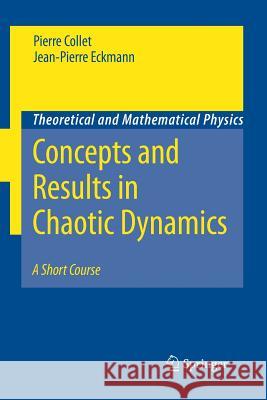Concepts and Results in Chaotic Dynamics: A Short Course » książka
Concepts and Results in Chaotic Dynamics: A Short Course
ISBN-13: 9783642421150 / Angielski / Miękka / 2014 / 232 str.
Concepts and Results in Chaotic Dynamics: A Short Course
ISBN-13: 9783642421150 / Angielski / Miękka / 2014 / 232 str.
(netto: 191,66 VAT: 5%)
Najniższa cena z 30 dni: 192,74
ok. 16-18 dni roboczych.
Darmowa dostawa!
This book is devoted to the subject commonly called Chaotic Dynamics, namely the study of complicated behavior in time of maps and ?ows, called dynamical systems. The theory of chaotic dynamics has a deep impact on our understanding of - ture, and we sketch here our view on this question. The strength of this theory comes from its generality, in that it is not limited to a particular equation or scienti?c - main. It should be viewed as a conceptual framework with which one can capture properties of systems with complicated behavior. Obviously, such a general fra- work cannot describe a system down to its most intricate details, but it is a useful and important guideline on how a certain kind of complex systems may be understood and analyzed. The theory is based on a description of idealized systems, such as hyperbolic systems. The systems to which the theory applies should be similar to these idealized systems. They should correspond to a ?xed evolution equation, which, however, need to be neither modeled nor explicitly known in detail. Experimentally, this means that the conditions under which the experiment is performed should be as constant as possible. The same condition applies to analysis of data, which, say, come from the evolution of glaciations: One cannot apply chaos theory to systems under varying external conditions, but only to systems which have some self-generated chaos under ?xed external conditions."











